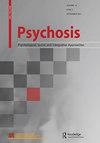A grounded theory analysis of care-coordinators’ perceptions of family growth associated with an experience of first episode psychosis
IF 1
4区 医学
Q4 PSYCHIATRY
Psychosis-Psychological Social and Integrative Approaches
Pub Date : 2022-01-14
DOI:10.1080/17522439.2021.1971743
引用次数: 2
Abstract
ABSTRACT Background Growth associated with a first episode of psychosis (FEP) is taken from post-traumatic growth literature, where positive changes are perceived following adverse circumstances. FEP is a critical period in which care-coordinators play a key role in working with families. Care-coordinators’ perceptions influence the way in which they work with families. Methods Eleven care-coordinators described their perceptions of growth within families with FEP through semi-structured interviews. Transcripts were analysed using social constructivist grounded theory. Results Care-coordinators perceived the existence of family growth in the form of enhanced communication, as well as less explicit forms of growth including distancing from unhelpful relationships and a re-establishment of norms and boundaries. Growth was inhibited by the construct of the “perfect family” model, a mis-trust in services due to suspiciousness or prior negative experiences of services. Discussion These inhibitors limit engagement with interventions and prevent open exploration of difficulties. Future work may consider how these findings align with the views of families.护理协调员对家庭成长与首发精神病经历相关的认知的理论分析
摘要背景与第一次精神病发作(FEP)相关的生长取自创伤后生长文献,在这些文献中,在不利的环境下可以感知到积极的变化。FEP是护理协调员在与家庭合作中发挥关键作用的关键时期。护理协调员的看法会影响他们与家人合作的方式。方法11名护理协调员通过半结构化访谈描述了他们对FEP家庭成长的看法。使用社会建构主义基础理论对成绩单进行分析。结果护理协调员以加强沟通的形式感知到家庭成长的存在,以及不那么明确的成长形式,包括远离无益的关系和重新建立规范和界限。“完美家庭”模式的构建抑制了增长,这种模式是由于怀疑或之前对服务的负面体验而对服务产生的不信任。讨论这些抑制剂限制了干预措施的参与,并阻止了对困难的公开探索。未来的工作可能会考虑这些发现如何与家庭的观点相一致。
本文章由计算机程序翻译,如有差异,请以英文原文为准。
求助全文
约1分钟内获得全文
求助全文
来源期刊
CiteScore
2.20
自引率
8.30%
发文量
36

 求助内容:
求助内容: 应助结果提醒方式:
应助结果提醒方式:


